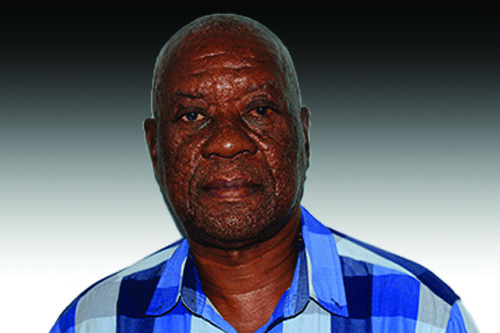Some of the existential questions of our time are poverty, inequality and the lack of economic opportunities meant to improve human security, dignity and the human condition (to borrow from Hannah Arendt).
For context, I will tease out a number of newspaper headlines from the past few months. ‘Mothers, babies sleeping on floor at Katutura hospital’; ‘Forty Omusati schools without water’; ‘Homeless man dies of ‘hunger’ in state care’; 42, 6 % of Namibia’s 507 249 households use bush, riverbeds for toilet’; ‘San community desperate for warm clothes, blankets’; ‘Parents threaten to close down dilapidated, unsafe school’; ’25% of Namibian houses are shacks’; ‘300 000 Namibian households without electricity’; ’Community hostel has no food for more than 50 pupils’; ‘Pupils taught in dilapidated mud classroom’.
Most of these headlines speak to a crisis in the health, education and housing sectors, as well as infrastructure and, above all, poverty.
About 1,6 million of Namibia’s 2,6m people live in poverty.
Those who have travelled widely on the continent would agree that most of the issues highlighted here apply to many other African countries.
TOP OF FORM, BOTTOM OF FORM
Africa is a continent that tends to reduce a good number of its people to haplessness.
There is always that strong sense of the impossible, a sense of hopelessness, created mainly by African governments and their rulers.
The question ordinary Africans and concerned outsiders always ask is: “Why is it that the richest continent should have proportionally most of the poorest people in the world?
Why should a 12-year old child go hungry in oil-rich Gabon, oil-rich Nigeria, oil-rich South Sudan, oil-rich Angola, diamond-rich Botswana, gold-rich SA, copper-rich Zambia, fish-rich Namibia or mineral-rich DRC?”
Is Namibia a failed state or becoming a failed state?
I will pose that essentially contested issue in the context of contemporary Namibia.
People, especially leaders and the emerging political and economic elite, talk about Namibia being a stable and peaceful country.
Yes, it is politically stable, but is it peaceful? How can a poor or hungry person be at peace?
Take vice president Nangolo Mbumba who recently told graduates at the University of Namibia Rundu campus they will live long and inherit a country richer than it is now.
Mbumba urged them to desist from social ills and focus on the light at the end of the tunnel, which is his predicted economic boom.
Current leaders would be remembered for paving the way for such a boom, he said to applause at a time when thousands of graduates are unemployed.
WAR AND PEACE
Peace is not just the absence of war, as Norwegian sociologist Johan Galtung would remind us, but must encompass satisfying the most basic of human needs such as food, access to clean drinking water, shelter, health and education.
Ideally, one would like to have not only a civil, but also a decent society.
When the Basic Income Grant (BIG) project was mooted in 2002, and eventually implemented at Otjivero, one of its basic objectives was to address poverty/hunger in a modest way.
But there were divergent views on this idea, if not outright opposition.
Former president Hifikepunye Pohamba, for example, came out strongly against the BIG for unemployed Namibians and others to be made universal in Namibia. Pohamba made what should become his most dishonourable statement as president: “We cannot dish out money for free to people who do nothing.”
Well, one of its main advocates, bishop Zephania Kameeta, was the minister of poverty eradication during Hage Geingob’s first term as president, and we thought the BIG would see the light of day.
It did not happen, and nearby two decades later, the BIG debate rages on.
Leaders are supposed to provide direction and vision and the very people who voted them into power need direction.
When he was president, Sam Nujoma said Namibia was going to follow the ‘Swedish model’.
Sweden is one of the classic welfare states of western Europe. We have seen nothing of the ‘Swedish model’ in Namibia.
Instead, the ruling and economic elite have been consolidating a class society. No one apart from the elite benefits from the country’s enormous natural resources.
‘TALK, TALK’
Contemporary Namibian society revolves around the legalised theft of public resources, corruption in high places, money and power.
It also revolves around symbolism, populist rhetoric, and slogans rather than substance – a lot of talk and no action.
The mass housing scheme has come to a halt, Tipeeg has failed, land reform flopped from the word go.
The final nail in the coffin of the land issue was an ‘intellectual’ who came up with the idea of 20 hectares for poor Namibians, while the elite can fence off close to 3 000 hectares of communal land.
We are infamously ranked as a country with one of the highest levels of inequality (UNDP 2009).
Namibia is increasingly unable to provide for the basic necessities of the majority of its population.
Sociologically and economically speaking, the factors outlined rank among the classic characteristics of a failed state.
- Alexactus T Kaure is a freelance writer.
Stay informed with The Namibian – your source for credible journalism. Get in-depth reporting and opinions for
only N$85 a month. Invest in journalism, invest in democracy –
Subscribe Now!






